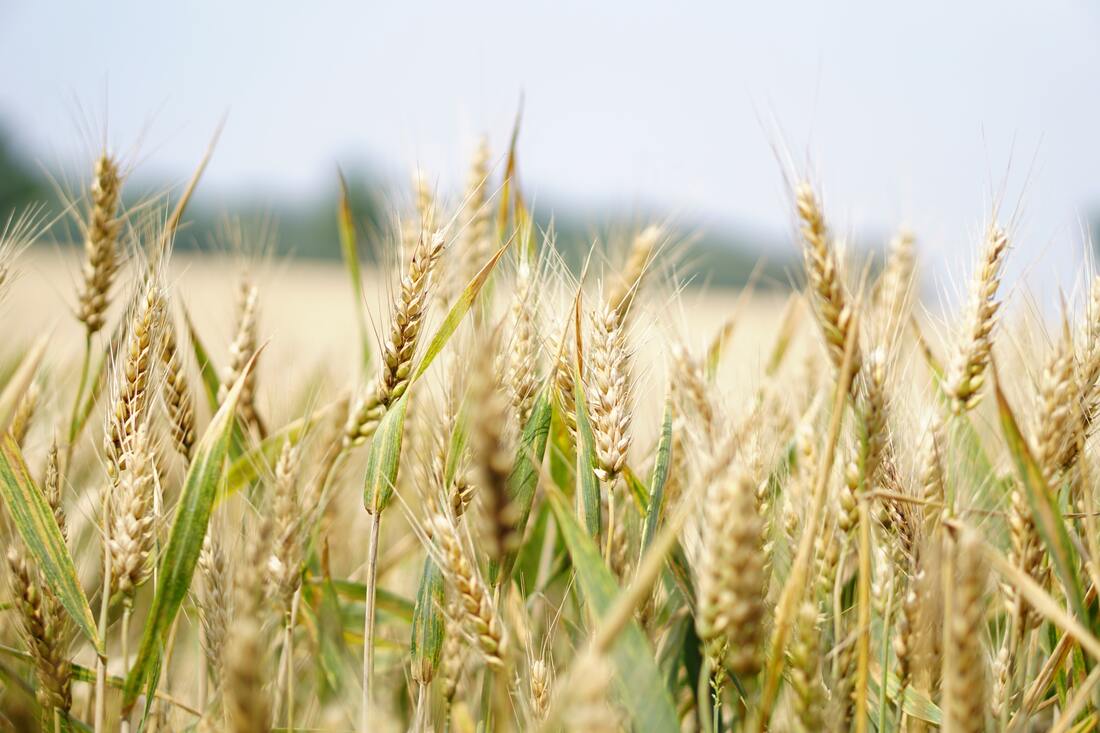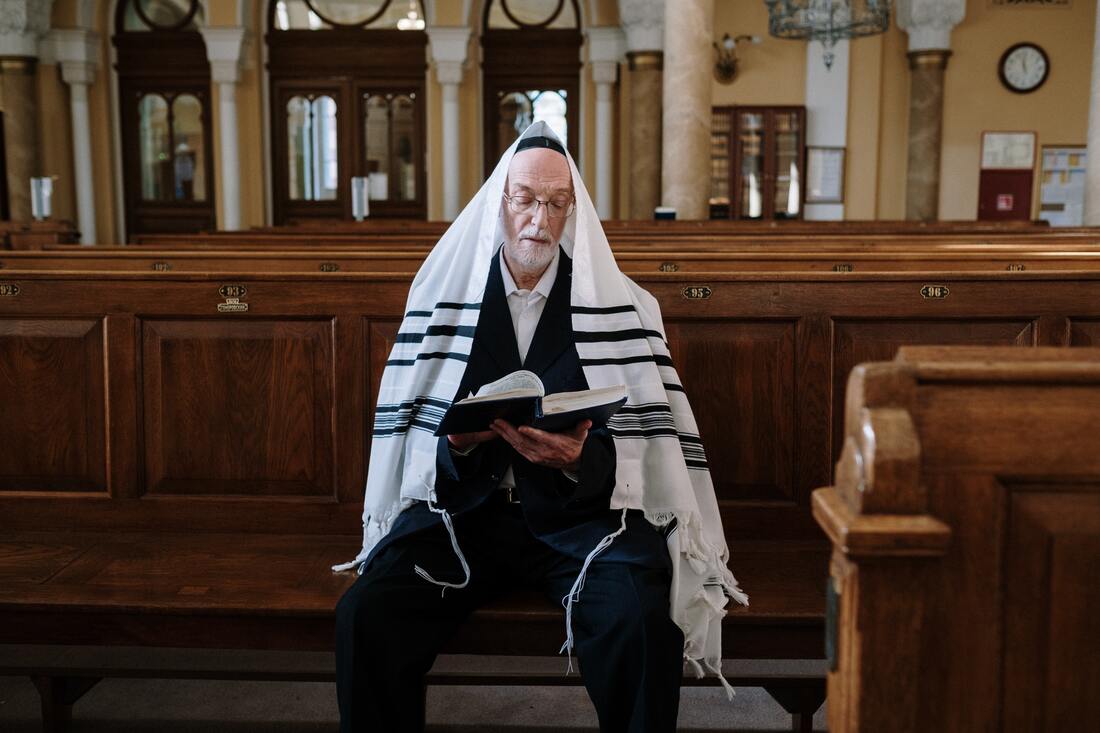|
Sundown tonight begins what is called holiest day on the Hebrew Calendar—Yom Kippur or The Day of Atonement. It is the final day of what the Jews call "The Ten Days of Awe." These ten days are meant for a time of reflection and returning to the Lord. The Day of Atonement is set aside as one to fast and confess sins to God. Psalm 139:23-24, written by King David, seems like the perfect prayer for this season. "Search me, God, and know my heart; test me and know my anxious thoughts. See if there is any offensive way in me, and lead me in the way of everlasting."
In David's time and under the Old Covenant, the high priest would have confessed the sins of Israel as he placed his hands on the head of two goats. This act was meant to transfer the burden of sin to the animals. Next, the priest would sacrifice one of the goats and a bull as an offering to the Lord. God explains what needed to happen in Leviticus 17:11. "For the life of a creature is in the blood, and I have given it to you to make atonement for yourselves on the altar; it is the blood that makes atonement for one's life." The blood of the sacrificial goat and bull would be brought into the Most Holy Place in the Temple. The blood placed on the altar was the atonement that cleansed the high priest, the people, and the sanctuary. It brought forgiveness and "covered" the sins of the people for a year, until Yom Kippur the following year. The Hebrew word "Kippur" means covering. The second goat is referred to as the "scapegoat." After the priest confessed the sins of the nation, transferring them to the goat, a trusted man would lead the scapegoat into a rocky place deep in the wilderness to ensure the death of the goat so that he would not make his way back into the Israelite camp. I think of Psalm 103:12 in reference to this act. “As far as the east is from the west, so far has He removed our transgressions from us.” You may ask about what happens today. God took care of this very issue. Since the shedding of blood is required for the atonement of sin, a new covenant was established. Believers in Yeshua, Jesus, have a better covenant through the blood of God's own Son. "God made Him who had no sin to be sin for us, so that in Him we might become the righteousness of God." (2 Corinthians 5:21) The prophet Isaiah described Jesus as "The Suffering Servant" in Isaiah 52 and 53. Verse 12 of Isaiah 53 says that He will be given "a portion among the great...because He poured out His life unto death and was numbered with the transgressors. For He bore the sin of many and made intercession for the transgressors." Our high priest, Jesus, permanently took away our sins. The Jews who do not know their Messiah are left with a dilemma. How do they find redemption without a blood sacrifice? It is my understanding that the rabbis have temporarily "suspended" the command for a blood sacrifice after the Temple was destroyed. Repentance is emphasized instead of sacrifice. Acts of charity are done in place of the commandment. We must pray that our Jewish brothers and sisters will have their blinders removed and that they will see that God has already sent a perfect sacrifice for the sins of all humanity. May they see the truth prophesied in Isaiah 53 as God's forever sacrifice for their redemption. Psalm 62:1 - "Truly my soul finds rest in God; my salvation comes from Him. Truly He is my rock and my salvation; He is my fortress. I will never be shaken." Soul rest is a deep rest where we follow the example that God gave us after creating the universe. "...On the seventh day He rested from all His work. Then God blessed the seventh day and made it holy, because on it He rested from all the work of creating that He had done." (Genesis 2: 2-3) Our bodies and souls were designed to need rest. In fact, every creature that God placed on earth needs rest. God called the day of rest the Sabbath because we are to stop our normal routines and direct our thoughts and actions toward Him. The fourth of the Ten Commandments says, "Remember the Sabbath day by keeping it holy." (Exodus 20:8)
The Greek word for rest is "anapauo" and its definition includes several possibilities such as refresh, rejuvenate, reinvigorate, and revitalize. Notice the "re" at the beginning of each word which means "anew." These words can apply not only to mankind and the creatures of the world but also to the land. God's instructions to the children of Israel concerning the land are explicit: "When you enter the land I am going to give you, the land itself must observe a sabbath to the Lord. For six years sow your fields, and for six years prune your vineyards and gather your crops. But in the seventh year the land is to have a year of sabbath rest, a sabbath to the Lord. Do not sow your fields or prune your vineyards. Do not reap what grows of itself or harvest the grapes of your untended vines. The land is to have a year of rest." (Leviticus 25:2-5) The Jews call this year the Shemitah year. In His instructions, the Lord makes provision for all people. He is aware that the poor and needy are in a position of not being able to provide for themselves or their families. Their daily existence is a struggle that makes it difficult for them to rest. In Leviticus 25:35 we see where God makes provision for them. "If any fellow Israelites become poor and are unable to support themselves among you, help them as you would a foreigner and stranger, so they can continue to live among you." How would a farmer who is ready to harvest his fields help the poor and the stranger so that they could rest from their worries? Leviticus 19:9 gives instructions on this: "When you reap the harvest of your land, do not reap the very edges of your field or gather the gleanings of your harvest. Do not go over the vineyard a second time or pick up the grapes that have fallen. Leave them for the poor and the foreigner. I am the Lord your God." Jonathan Cahn of Hope of the World Ministries teaches that the Hebrew word for harvest is "Katzeer." He tells us that God's children need to learn the law of the Katzeer which says that we should not reap the ends or corners of our land but leave them for the poor and the stranger so that they may be fed. Since most of us are not farmers, how does this law apply to us? It has to do with our mindset. It requires us to have faith in God that there will always be more than enough. What does this look like? It means making a choice to give away portions of our possessions like time, energy, money, and love. These are the corners of our fields. When we give to others in this way God fills our cups to overflowing and makes our harvests spectacular. On the Jewish calendar, the first month of the civil year and the seventh month of the religious year coincide. The seventh month is called Tishrei, meaning beginning. Seven is the number of completion or perfection, so it is significant that the three fall feasts occur in this month. The New Year occurs on the first day of this month. The celebration, also known as Rosh Hashanah or The Feast of Trumpets, occurs at sundown on September 15 on our calendars. The shofar, an instrument made of a ram's horn, will be blown to call the Jews together so they can consider the past year and look at the year ahead. The sound is meant to awaken the souls of those who hear it so that they are prompted to return to God. The horn brings to remembrance the ram that Abraham offered to God as a sacrifice in place of his son, Isaac. It is also a reminder for God's people to remain humble in the face of a holy God.
Another name for the Jewish New Year is "The Day of Judgment." It begins the fall feasts. These feasts are meant to lead those celebrating into right standing with God. Joel 2:1 commands, "Blow the trumpet in Zion; sound the alarm on my holy hill." The shofar is sounded 100 times at Rosh Hashanah. Not only does it call for a gathering of God's people, but it also reminds them to go to war against anything that is contrary to God's truth. We should be encouraged by the words of Joel 2:12-15. "'Even now,' declares the Lord, 'return to me with all your heart, with fasting and weeping and mourning.' Rend your heart and not your garments, return to the Lord your God, for He is gracious and compassionate, slow to anger and abounding in love and He relents from sending calamity. Who knows? He may turn and relent and leave behind a blessing...Blow the trumpet in Zion, declare a holy fast, and call a sacred assembly." God is focused on our redemption. The New Year is to be a time for a reset for all of humanity after a time of self-reflection and repentance. The number of the year is one that speaks to us about the Lord's intentions. In order to follow what many of the prophets are saying about the year to come, we must understand that every letter in the Hebrew alphabet is a picture that conveys a message and has a numerical value. 5784 is the number of the New Year. The fourth Hebrew letter is "Dalet" and has a pictographic meaning of a door or portal. God created the sun, moon, and stars on the fourth day, and their light separates us from darkness. These celestial bodies indicate our times on the calendar. Thus, our Creator regulates our times and seasons, and Tishrei is meant to demonstrate the linking of time and authority. Let us look at all the numbers of this year: Five is the number of grace. Seven is the number of perfection. Eight is the number of new beginnings. And four is the number of a door. We are four years into the decade of the 80s. This number 80 is the seventeenth letter of the Hebrew alphabet and is the picture of a mouth. It is called "Pey" and is associated with speech and other functions of the mouth like blowing. What does this say to us as we consider the year 5784? Remember that God created the world with His spoken word. Since we are made in His image, our sounds have power as did His. We have been given the power to bless or curse. Proverbs 18:21 tells us, "The tongue has the power of life and death..." Then we have Psalm 81:10 that promises, "...Open wide your mouth and I will fill it." God is the one who fills us with good things! The ten days between Rosh Hashanah (The New Year) and Yom Kippur (The Day of Atonement) are called The Days of Awe because the Jews believe their actions during these ten days can alter the decree God writes about them in His heavenly book. I believe we have a great opportunity to walk through new doors in the year to come. Perhaps this is time for us to experience growth in a new dimension—the fourth or spiritual dimension. Believers have legal access to the spirit realm. Ephesians 2:6 confirms this: "God raised us up with Christ and seated us with Him in heavenly realms in Christ Jesus." Could the declaration of our faith move us into a season of creation that we have not seen before? We must embrace the promises of God by declaring them so that the door of blessing and opportunity is open for us. Let it be! In just two weeks, the Jews will be celebrating their New Year, Rosh Hashanah. Central to their celebration is the reading of the story of Abraham and his willingness to sacrifice his son, Isaac, at the command of God. Because of his act of faith in God, Abraham has become known as The Father of Faith. He began to demonstrate faith when God first spoke to him at the age of 75. God said to him, "Go from your country, your people, and your father's household to the land I will show you. I will make you into a great nation, and I will bless you; I will make your name great, and you will be a blessing. I will bless those who bless you, and whoever curses you I will curse; and all people on earth will be blessed through you." (Genesis 12:2-3) Abram, as he was known then, put feet to his faith and set out for the Promised Land.
Abram had another encounter with God when he was 99 years old. God said to him, "As for me, this is my covenant with you. You will be the father of many nations. No longer will you be called Abram; your name will be Abraham, for I have made you a father of many nations." (Genesis 17:4-5) To seal the promise God was making, He required all males to be circumcised as a sign of this everlasting covenant. Faith was to become the key for all nations to be part of the family of God. That faith must be established through our belief that Jesus Christ is the Son of God and died for our sins. If we make this decision, the righteousness of Christ is given to us. Romans 4:9 tells us that "Faith was credited to Abraham as God's righteousness!" (TPT) Faith in God and righteousness go hand-in-hand. Romans 4:3, in The Passion Translation, explains this. "Because Abraham believed God's words, his faith transferred God's righteousness into his account." Romans 4 also makes it clear that this righteousness is available to every person on the face of the earth. Look at Romans 4:10-11. "How did he (Abraham) receive this gift of righteousness? Was he circumcised at the time God accepted him, or was he still uncircumcised? Clearly, he was an uncircumcised gentile when God said this of him! It was later that he received the external sign of circumcision as a seal to confirm that God had already transferred His righteousness to him by faith, while he was still uncircumcised." (TPT) God's promises to Abraham were ultimately fulfilled through Jesus Christ who is in Abraham's line. Notice that God did not select a perfect man in Abraham. We can see the mistakes that he made and sins that he committed. He learned through these and grew in faith. The ultimate test of his faith was when he was told to sacrifice Isaac, his only son. He traveled approximately 50 miles to Mount Moriah and had an abundance of time to reconsider what he was about to do. But Abraham demonstrated that he loved God more than he loved the promise. Through his commitment to follow God's command, he was rewarded with blessings that confirmed his faith in God. We can be assured that our faith in God will be tested. That is the only way for it to grow. God wants to increase His righteousness in our "accounts" through increasing our faith. Why else would He send his Son to earth to die? "God made Him who had no sin to be sin for us, so that in Him we might become the righteousness of God." (2 Corinthians 5:21) It seems to me that when we pass our tests, we get a double bonus: increased faith and righteousness. |
Joan E. MathiasCategories
All
Archives
July 2024
|




 RSS Feed
RSS Feed